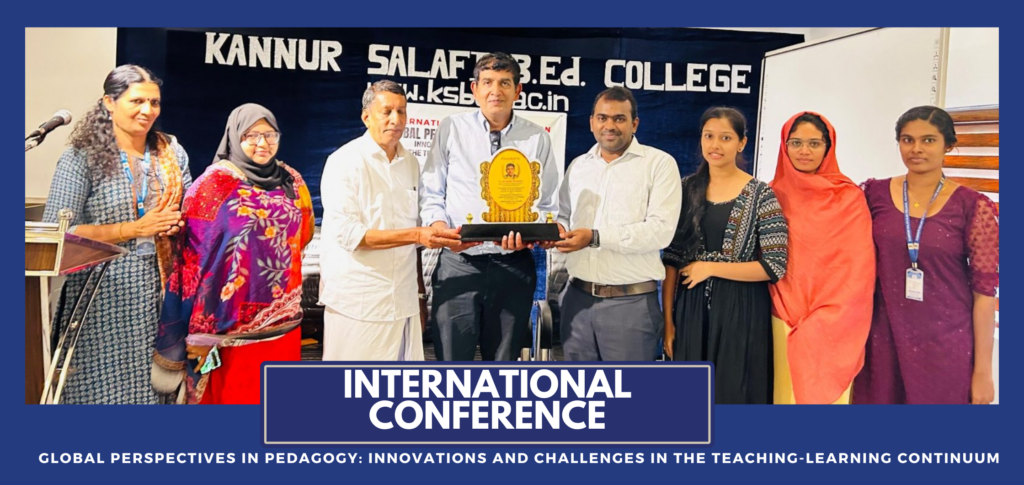

Conference Date: 17,18 January 2024
Registration Information:
Registration Last Date:
31 December, 2023 (EXTENDED DATE)
Paper Submission Last Date: January 10, 2024
Registration Link: https://forms.gle/cJVTLK4BnFy8Vhyz6
Conference Proceedings
The proceedings of the conference including the abstracts of the papers presented will be published at www.ksbed.ac.in in a downloadable format.
Publication of the Papers:
The papers meeting the publication standards and quality can be assisted to publish in a peer reviewed e-journal ‘Conflux Journal of Education’ or in an edited book with ISBN.
Participants wishes to publish the paper can choose the preferred option while submitting the registration form.
Fee For Publication:
E-journal: The additional cost for publication is Rs.400

WHATSAPP: 8907162762
Dr.Naseerali M.K.
FINAL REPORT OF THE CONFERENCE
Concept: Education is a dynamic field that constantly evolves with societal changes and technological advancements. The “International Conference on Global Perspectives in Pedagogy: Innovations and Challenges in the Teaching-Learning Continuum” seeks to provide a platform for educators, researchers, and practitioners to explore and discuss the latest trends, innovations, and challenges in the realm of education on a global scale.
Sub-themes:
- Technology Integration in Education: Concept: This sub-theme delves into the transformative impact of technology on education. It explores how educators can effectively integrate digital tools, e-learning platforms, and gamification into their teaching methods. Discussions will encompass the advantages and challenges of technological innovations in the learning process.
- Inclusive Education: Concept: Inclusive education is about embracing diversity within the classroom. This sub-theme focuses on strategies to create an inclusive learning environment, accommodating students with special needs, and fostering a culture of inclusivity within educational institutions.
- Assessment and Feedback Strategies: Concept: Effective assessment and feedback are crucial components of the teaching-learning process. This sub-theme examines innovative approaches to formative and summative assessments, explores feedback mechanisms for student improvement, and considers the balance between quantitative and qualitative assessment methods.
- Teacher Professional Development: Concept: Continuous learning for educators is essential in a rapidly changing educational landscape. This sub-theme addresses pedagogical training for emerging educational trends, mentoring and support systems for educators, and the role of ongoing professional development in improving teaching practices.
- Cross-Cultural Education Practices: Concept: As education becomes more globalized, understanding and navigating cultural differences is paramount. This sub-theme explores how educators can adapt their practices to be culturally responsive, strategies for fostering cross-cultural understanding in education, and international collaboration in educational research and practices.
- Student Engagement and Motivation: Concept: Engaging students and motivating them to learn are ongoing challenges for educators. This sub-theme delves into creating conducive learning environments, strategies for motivating diverse student populations, and the balance between extrinsic and intrinsic motivation in education.
- Globalization of Education: Concept: This sub-theme examines the internationalization of curriculum and programs, challenges, and opportunities in global educational partnerships, and navigating cultural differences in a globalized educational landscape.
- Sustainability in Education: Concept: Integrating environmental sustainability into the curriculum is increasingly important. This sub-theme explores how education can contribute to sustainable practices, promoting global citizenship, and social responsibility within educational institutions.
- Blended Learning Models: Concept: Blended learning combines online and offline elements for a comprehensive educational experience. This sub-theme discusses the effectiveness of hybrid learning approaches, best practices in implementing blended learning, and the integration of online and offline learning experiences.
- Education Policy and Reform: Concept: Education policies shape the landscape of teaching and learning. This sub-theme analyzes the impact of policy changes, advocates for evidence-based educational reforms, and addresses challenges and opportunities in policy implementation.
The conference aims to foster rich discussions, share best practices, and inspire collaborative initiatives that contribute to the advancement of education globally. It invites participants to engage in a dialogue that transcends borders and enriches the collective understanding of pedagogy in the 21st century.

GUIDELINES FOR PRESENTERS
Thank you for your participation as a presenter at our upcoming conference. To ensure a smooth and successful presentation experience, please carefully follow these guidelines when preparing and submitting your paper:
1. Title Page:
- Your paper must begin with a Title Page that includes the following information:
- Title of the Paper
- Author(s) Full Name(s)
- Author(s) Contact Details (email address)
- Author(s) Affiliations (institution, department, city, country)
2. Abstract and Keywords:
- Include an abstract of your paper. The abstract should provide a brief, clear summary of your research, including the research question, methodology, key findings, and conclusions. The abstract should not exceed [word count limit] words.
- Provide a list of key terms or keywords that accurately represent the content of your paper. These keywords will help conference attendees find your presentation in the program.
3. Paper Format:
- Format your paper in accordance with the guidelines specified in the American Psychological Association (APA) 7th edition. Ensure the following:
- Use 12-point Times New Roman font.
- Double-space the entire document.
- Maintain 1-inch margins on all sides.
- Include page numbers in the top right corner.
4. Citations and References:
- Use APA 7th edition style for in-text citations and references.
- Properly cite all sources and references used in your paper.
- Ensure that your references section is complete and follows the APA guidelines.
5. Co-Authors:
- Each co-author who wishes to attend the conference and present the paper must register separately. Registration is required for each presenter.
6. Originality and Similarity Index:
- Your paper must be original and not exceed a similarity index of 10%. Papers with a similarity index above this threshold will not be considered for further pre-publication review.
7. Fee and Refund Policy:
- Submission of your paper and registration fees are non-refundable. In the event that your paper is rejected for any reason, including exceeding the similarity index threshold, the registration fee will not be refunded.
8. Submission Deadline:
- Submit your final paper by the deadline specified in the conference schedule. Late submissions may not be accepted.
9. Presentation Preparation:
- Prepare a clear and concise presentation based on your paper.
- Practice your presentation to ensure it can be delivered within the allotted time.
- Be prepared to answer questions from the audience during the Q&A session.
10. Technical Requirements:
- Familiarize yourself with the technical setup and requirements for the virtual or physical conference.
- Test your audio, video, and presentation software in advance to avoid technical issues during your presentation.
11. Copyright and Legal Issues:
- By submitting your paper, you affirm that you have the right to present and publish the content and that it does not infringe upon any copyright or intellectual property rights.
- Any legal issues related to the content of the paper shall be the sole responsibility of the contributor. Neither the organizing institutions nor the organizing team will be responsible for any legal disputes or claims arising from the paper’s content.

